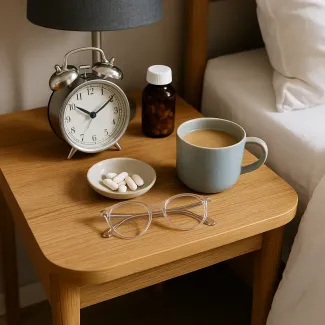
Reclaiming Deep, Restorative Sleep in Your 50s and Beyond
Natural strategies to improve sleep quality, energy, and recovery as you age
As we move through our 50s, sleep patterns begin to shift, often in frustrating and disruptive ways. What used to be a consistent eight-hour rest may now be a patchwork of light dozing, early awakenings, or restless tossing and turning. These changes aren’t just inconvenient—they affect mental clarity, immune resilience, metabolism, and emotional balance. Thankfully, understanding what’s happening in your body and implementing targeted adjustments can significantly improve your sleep quality and restore nighttime recovery.
Why Sleep Changes After 50
One of the most common and overlooked aspects of aging is how circadian rhythms evolve over time. In our 50s, the suprachiasmatic nucleus—the brain’s internal clock—becomes less responsive to light and external cues, making it harder to maintain deep, uninterrupted sleep. Additionally, hormonal fluctuations, particularly the decline in melatonin and growth hormone, contribute to more fragmented sleep cycles. You may fall asleep faster but wake more often.
Moreover, lifestyle stressors, increased sensitivity to caffeine and alcohol, pain from inflammation or joint issues, and medications can all amplify sleep disruption. Many people also experience a drop in slow-wave sleep, the most restorative phase, resulting in feelings of daytime fatigue, even after what seems like a full night’s rest.
The Role of Hormones and Metabolism in Midlife Sleep
Hormones like estrogen, progesterone, and testosterone play pivotal roles in regulating sleep latency, depth, and consistency. In women, the menopausal transition often brings hot flashes, night sweats, and mood swings—all of which interfere with sleep. For men, lower testosterone can lead to sleep apnea, lower energy, and reduced REM sleep.
In parallel, metabolic changes start to show more clearly around the age of 50. Insulin sensitivity decreases, weight tends to increase, and inflammation levels rise—all factors that can lead to disrupted sleep, especially when blood sugar drops during the night.
Foundational Lifestyle Adjustments to Promote Restorative Sleep
To counteract these physiological changes, it’s crucial to introduce lifestyle routines that reinforce a natural sleep-wake cycle. These adjustments don’t require overhauls but rather strategic consistency.
Avoid stimulating activities close to bedtime, such as screen time or late-night news. Instead, consider implementing sleep-inducing rituals like herbal teas, light stretching, or even infrared light therapy in the early evening. Stick to consistent sleep and wake times—even on weekends—to help reinforce circadian rhythms.
Keep your bedroom cool, dark, and quiet. Thermoregulation becomes more sensitive in later life, so managing bedroom temperature (around 18°C / 64°F) can prevent midnight awakenings.
A light dinner rich in tryptophan, magnesium, and complex carbohydrates can assist with melatonin production. Foods like oats, bananas, leafy greens, and almonds contribute naturally to the relaxation response and neurotransmitter balance required for better sleep.
Supplements That Support Sleep After 50
Many individuals over 50 find relief with targeted supplementation. While these should not replace healthy habits, they can fill gaps caused by age-related depletion.
Magnesium glycinate is one of the most effective supplements for calming the nervous system without causing drowsiness the next day. It helps relax muscles and reduce the symptoms of restless leg syndrome, a common disruptor in older adults.
Melatonin levels decline naturally with age, but supplemental melatonin can help shift sleep onset earlier and reduce sleep latency. However, doses should remain low (0.3–1 mg), as higher doses can disrupt circadian feedback loops.
L-theanine, an amino acid found in green tea, promotes alpha wave activity, which is associated with calm wakefulness and smoother transitions into sleep.
Ashwagandha and valerian root are herbal adaptogens that support the body’s ability to relax without being sedatives. They regulate cortisol levels, which if too high in the evening, can keep you awake.
For individuals with menopause-related sleep issues, phytoestrogens from red clover or soy may help with night sweats and hormonal imbalances that disturb sleep.
The Impact of Movement on Sleep Architecture
Physical activity remains one of the strongest non-pharmaceutical tools to improve sleep in your 50s. Regular movement—not just formal exercise—improves sleep efficiency, increases slow-wave sleep, and decreases the time it takes to fall asleep.
Aim for a blend of resistance training, low-impact aerobic movement, and mobility exercises. Yoga, tai chi, or Pilates in the late afternoon or early evening can help downregulate the nervous system, preparing the body for rest.
Walking in the morning under natural light also enhances melatonin production later in the day. Exposure to daylight, even on cloudy days, helps align your biological clock and supports nighttime sleep.
Managing Stress and Evening Mental Overactivity
Mental overstimulation is one of the most common reasons why people over 50 struggle to fall asleep. The prefrontal cortex remains highly active when unresolved thoughts or worries dominate the evening.
To combat this, introduce calming evening routines like journaling, reading fiction, or engaging in mindfulness practices. Even ten minutes of deep breathing or progressive muscle relaxation can have a profound effect on parasympathetic nervous system activation.
Digital detoxing—avoiding screens at least 90 minutes before bed—is particularly powerful. Blue light from screens suppresses melatonin and increases alertness, both of which interfere with natural sleep onset.
The Influence of Blood Sugar Stability During the Night
Fluctuating blood sugar is a hidden yet common cause of nighttime wakefulness, particularly between 2 and 4 a.m. When blood glucose drops, cortisol and adrenaline spike to bring sugar back to normal, jolting you awake.
Eating a balanced, low-glycemic evening snack that includes fat, fiber, and protein can stabilize nighttime blood sugar. Options include Greek yogurt with flaxseed, apple slices with almond butter, or a boiled egg with avocado.
Avoid high-carb meals late in the evening and limit alcohol, which may initially sedate but leads to fragmented sleep in the second half of the night.
How Breathing Techniques and Nasal Health Impact Sleep
As we age, our breathing patterns change, and many people begin to mouth-breathe during sleep, especially if nasal passages are restricted. This leads to reduced oxygenation, increased risk of snoring and sleep apnea, and less restful sleep overall.
Training yourself to breathe through your nose—by practicing during the day or using nasal strips at night—can enhance deep sleep quality and reduce the frequency of night waking.
Try box breathing or 4-7-8 breathing techniques before bed. These help reduce sympathetic arousal, bringing the heart rate and blood pressure into a restful rhythm.
The Connection Between Gut Health and Sleep Hormones
A lesser-known but powerful connection exists between the gut microbiome and sleep regulation. Over 90% of serotonin—a precursor to melatonin—is produced in the gut. If your microbiome is imbalanced, your ability to regulate sleep can suffer.
Consume a diet rich in fermented foods, prebiotic fibers, and polyphenol-rich plants. Foods like kefir, kimchi, chicory root, blueberries, and flaxseeds contribute to a thriving gut environment that supports hormonal and neurotransmitter stability.
Consider adding a probiotic supplement targeted toward sleep and mood support, particularly if you’ve recently taken antibiotics or experience frequent digestive issues.
Adjusting Sleep Timing With Age
People over 50 often experience an advanced sleep phase, meaning they get tired earlier in the evening and wake earlier in the morning. This is not necessarily a disorder, but if it clashes with lifestyle demands, it can cause sleep deprivation.
If needed, gently shift your sleep phase by adjusting light exposure. Spend time in bright natural light in the late afternoon, and reduce indoor lighting intensity in the last two hours before bed.
Avoid naps longer than 30 minutes, especially after 3 p.m., as these can interfere with nighttime sleep pressure. If you feel sleepy during the day, a short nap or a 15-minute walk outdoors can help reset your rhythm without disrupting your night.
Creating an Evening Wind-Down Ritual That Works
Routines become increasingly important for sleep as we age. The brain thrives on predictability, especially when it comes to preparing for rest.
Design a simple wind-down routine that begins about 60–90 minutes before your desired bedtime. This might include a warm shower, drinking herbal tea like chamomile or lemon balm, dimming lights, and listening to slow instrumental music.
Keep stimulation to a minimum. Avoid checking emails or watching stimulating shows during this window. This is a time to transition into stillness, signaling to your body that it’s time for sleep.
The Role of Bedroom Environment and Sleep Tools
Upgrading your sleep environment can significantly improve sleep quality after 50. Invest in a mattress that supports joint health, breathable bed linens, and noise-reducing tools like earplugs or white noise machines.
Blackout curtains or sleep masks can block ambient light, especially during summer months when sunrise is early. If your partner snores, consider separate sleep environments or test anti-snoring devices that support nasal breathing.
Essential oils like lavender, sandalwood, and vetiver may help relax the mind. Diffusing these oils in the evening can set a calming tone for the room.
Balancing Evening Hydration Without Nighttime Trips
Hydration is important, especially for joint lubrication, digestion, and cognitive clarity. However, excessive fluids in the evening can lead to frequent nighttime urination (nocturia), interrupting deep sleep.
Aim to drink the majority of your fluids during the day and taper off after 6–7 p.m. If you feel thirsty before bed, limit yourself to a few small sips. Herbal teas that are naturally diuretic-free—like rooibos or tulsi—can provide comfort without overstimulating the bladder.
Avoid caffeine after 2 p.m. and check labels of hidden sources such as chocolate, green tea, and certain medications.
How Sleep Tracking Can Guide Behavioral Changes
While it’s not essential, using a sleep tracker can offer valuable insights into your sleep stages, awakenings, and overall patterns. If used mindfully, it can help you spot trends and correlate changes in habits with improvements in sleep duration and quality.
Avoid becoming obsessive or anxious about numbers, though. The goal is to empower informed adjustments, not trigger stress. Track trends over time rather than fixating on nightly data.
Listening to Your Body and Adjusting Accordingly
The key to sleeping well after 50 isn’t in replicating youthful sleep, but in learning what your body now needs—and meeting it with care and consistency. With the right routines, nourishment, and environmental support, your sleep can become deep, restorative, and energizing, setting the foundation for strength, clarity, and balance in your next chapter of life.


